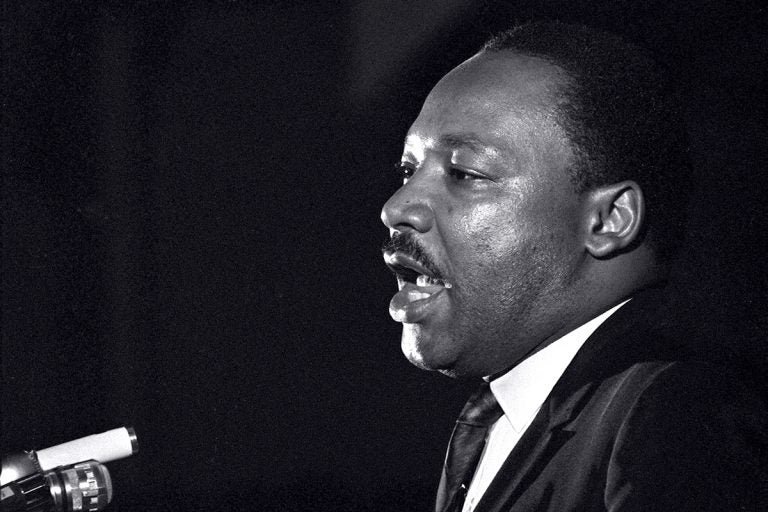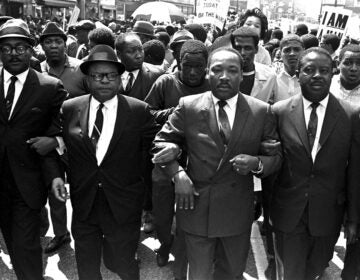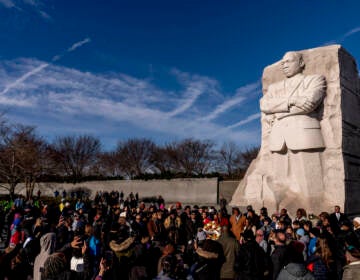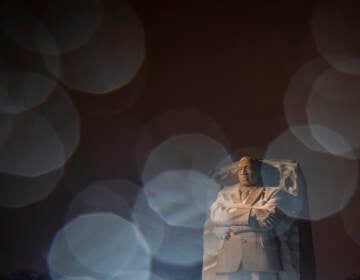Martin Luther King’s final speech, ‘standing up for the best in the American dream’
Fifty years dead, Martin Luther King reminds us that we can still see the stars.

Dr. Martin Luther King Jr. makes his last public appearance at the Mason Temple in Memphis, Tenn., on April 3, 1968. (AP Photo/Charles Kelly)
If a bullet traveling 2,670 feet per second had not pierced Martin Luther King’s face 50 years ago tonight, if instead he was still alive at age 89, he would be disappointed to find the White House in the grip of a racist demagogue. But even in this dark hour, with the long arc of justice bending backward, King still lights the way.
In his final speech, the night before he died, he said: “Only when it is dark enough can you see the stars.” What he said in Memphis on April 3, 1968 — riffing without notes to an audience of striking black sanitation workers — clearly resonates today. We all know his closing line (“I’ve been to the mountaintop … and I’ve seen the promised land. I may not get there with you”); less well known is the speech itself — and why he was in Memphis to deliver it.
Eight weeks before that final speech, Memphis sanitation workers Robert Walker and Echol Cole were crushed to death by a defective compactor in the back of an obsolete garbage truck. Two similar fatalities had occurred on an obsolete truck four years earlier. But the sanitation workers — overwhelmingly black and ill-paid, known in the city as “unclassified laborers” — had no way to register grievances. They also had no benefits, or insurance, or overtime, or pensions, or sick leave. Nor was the city of Memphis contractually obligated to financially help the widows of Walker and Cole.
The mayor also insisted that the 1,300 sanitation “nigras” had no right to strike — but they did it anyway, on Feb. 12. As the journalist Garry Wills later said, these workers — most of whom were the descendants of Delta slaves — were “the world’s least likely revolutionaries.”
James Lawson, a local minister with ties to King and the civil rights movement, helped organize the strike; he told the workers that their black lives mattered: “You are human beings. You deserve dignity. You aren’t a slave — you’re a man.” The strikers staged a series of marches, some of them tinged with violence. The strike would finally end on April 16 — when the city agreed to hike wages and recognize a workers’ union — but King would not live to see it.
He flew in several times to join the marchers and bless the cause. He arrived in town for the last time on April 3, amidst tornado warnings that threatened to dampen turnout for a strikers’ rally at a local auditorium. Stricken with a sore throat and heavy cold, he toyed with canceling his appearance, but an aide told him, “There’s two thousand people braved the storm for you.”
So he went, ignoring the tornado sirens. The heavy wind shook the building’s shutters, but he found his rhythm, especially in these moments:
“[T]he world is messed up. The nation is sick, trouble is in the land, confusion all around … We are saying that we are determined to be men. We are determined to be people. We are saying we are God’s children, and if we are God’s children, we don’t have to live like we are forced to live …
“All we say to America is to be true to what you said on paper. If I lived in China or even Russia, or any totalitarian country, maybe I could understand … the denial of certain basic First Amendment privileges, because they haven’t committed themselves to that over there. But somewhere I read of the freedom of assembly. Somewhere I read of the freedom of speech. Somewhere I read of the freedom of press. Somewhere I read that the greatness of America is the right to protest for right …
“Let us rise up tonight with a greater readiness. Let us stand with a greater determination. And let us move on in these powerful days, these days of challenge, to make America what it ought to be. We have an opportunity to make America a better nation … standing up for the best in the American dream, and taking the whole nation back to those great wells of democracy, which were dug deep by the founding fathers in the Declaration of Independence and the Constitution.”
And he offered timeless advice for all who seek to protest injustice: Stand tall, straighten your backs. He said that “whenever men and women straighten their backs up, they are going somewhere, because a man can’t ride your back unless it is bent.”
The #MeToo and #TimesUp marchers know this. The Black Lives Matter marchers know this. The Parkland students know this. The mass of Americans who will flood the streets if Trump fires Mueller — they know this. Fifty years dead, Martin Luther King reminds us that we can still see the stars.
WHYY is your source for fact-based, in-depth journalism and information. As a nonprofit organization, we rely on financial support from readers like you. Please give today.




